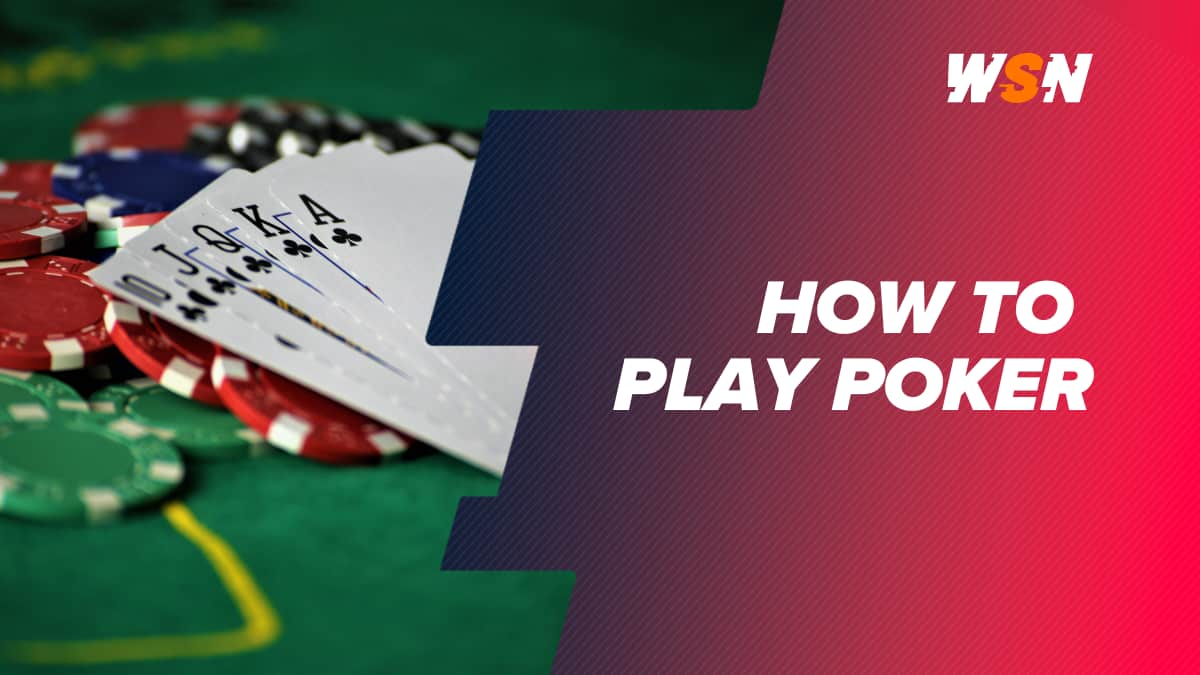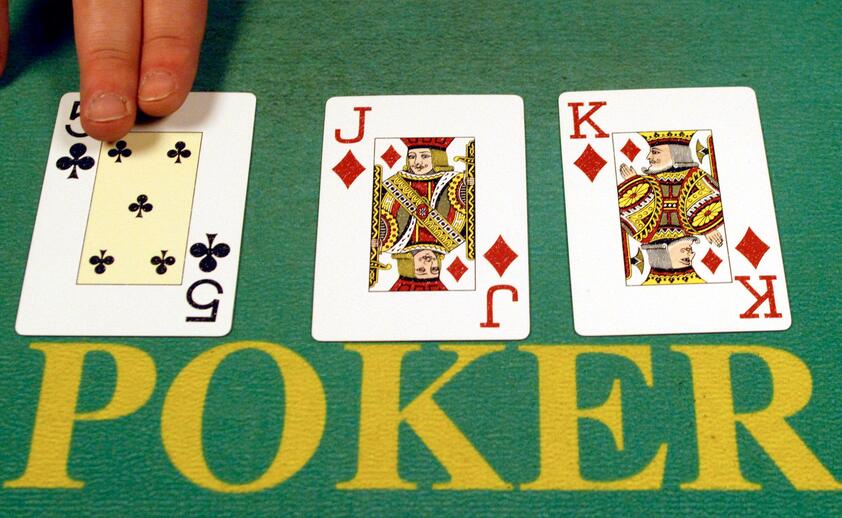It’s been called the “national card game of the United States,” but nobody is born knowing how to play poker.
There are countless variants, and games can be played by two to 14 people. Generally, you’re aiming to win the pot of money, which is the sum of all players’ bets for the deal. You either do this by having the best hand or by bluffing your way through.
Our guide will walk you through how to play poker for beginners, so by the end, you’ll know the basics, have some strategies, and learn how to play responsibly.

To start, here are the basics of poker.
A standard poker hand consists of five cards, and its value depends on the specific combination of those cards. Some combinations rank higher than others. When you place a bet, you are signaling that you believe your hand is stronger than your opponent's. Other players can either match your bet (call) or give up (fold).
Bluffing is a major part of the game, which means you do not always know who actually has the best hand until the end. In fact, you can win a round even with a weaker hand if you manage to convince everyone else that you are holding a stronger one.
Poker uses a standard deck of 52 cards. The ace ranks high apart from when it is part of a straight, which is five cards with consecutive numbers, or a straight flush.
The rank of your hand is determined by its probability of happening. The less likely it is, the higher it ranks.
Here are the ranks in order of the best:
Royal flush: Ace, king, queen, jack, and 10 all in the same suit.
Straight flush: Five cards in a sequence of the same suit, such as six, seven, eight, nine, and 10 of hearts.
Four of a kind: Four cards of the same rank plus an unmatched card, such as four aces and a king.
Full house: Three cards of the same rank and two of another, such as three aces and two kings.
Flush: Five same-suit cards of any rank, such as a four, five, eight, 10, and king of diamonds.
Straight: Five cards in a sequence that are not all the same suit.
Three of a kind: Three cards of the same rank plus two that are unmatched.
Two pair: Two sets of two cards of the same rank plus another of a different rank, such as two aces, two kings, and a seven.
One pair: Two same-rank cards plus three others that are unmatched.
High card: Any configuration with cards ranked highest to lowest.

At the start of the game, the cards are dealt to the left. When you can bet depends on the variant being played.
Since most online casinos have Texas Hold ’em, we’ll go through the order of play for this variant so you can learn how to play poker at almost any US online casino.
The Blinds: The two players on the dealer’s left start things off by placing the small blind and the big blind. These start off the game, and these players must bet.
Hole Cards: Each player receives two hole cards. These cards are placed face down and are private to the player.
Pre-Flop: The next player, which is the one to the left of the big blind, can choose to fold, call and match the big blind, or raise. This is the first round of betting.
The Flop: Next, three community cards are placed face up in the center of the table by the dealer.
Post-Flop: There’s another betting round beginning with the first active player to the left of the dealer.
The Turn: A fourth community card is laid face up.
The Third Betting Round: Players bet again, choosing to fold, call, or raise.
The River: A fifth and final community card is dealt face up.
Final Betting Round: Players bet one final time.
Showdown: If there are still at least two players in the game, they show their hole cards. The person who makes the best five-card hand using their hole cards combined with the community cards wins the pot.
Let’s say the community cards are the 10 of spades, the jack of hearts, the queen of clubs, the nine of diamonds, and the two of hearts.
Here’s what the players reveal:
Player 1: King of spades and eight of clubs.
Player 2: Ace of diamonds and jack of clubs.
Player 1’s best hand is a straight from nine to king. Player 2’s best hand is a pair of jacks. Since the straight ranks higher than the pair, Player 1 wins.
While both games share poker hand rankings, poker and video poker are very different experiences. In video poker, you play solo against a computer, using a slot-style interface. The goal is to make the best five-card hand after a single draw. Strategy matters, but there’s no bluffing or reading opponents involved. Learning how to play video poker will help you understand the basics of poker, but won't be enough to win it.
Traditional poker, on the other hand, is a multiplayer game where you compete against other real players. Success depends not only on the strength of your cards but also on your ability to read opponents, manage bets, and use tactics like bluffing. Just as movies have taught us, bluffing is an integral part of any player's poker strategy.
Whether you’re playing Texas Hold’em or Omaha, poker is more dynamic and social than video poker.
Learning how to play online poker is as much about understanding the game basics as it is about bluffing. Here are some tips to make your game as great as possible:
Observe. When you’re not active in the game, use the time to observe your opponents. Try to figure out if they’re bluffing.
Understand position. Especially in Texas Hold’em, know how much position influences the game. The best position is being last to act on the hand.
Learn the odds. Spend time learning the odds of making a good hand. Work out how many “outs” you have. In other words, how many cards are left in the deck that could help you win.
Manage your bankroll. Long-term poker success depends on how well you protect and manage your bankroll, or, in other words, the money you have set aside to play.
Play tight and aggressive. Take control by playing fewer hands and betting aggressively.
Choose your starting hand with care. Starting out properly is important. Don’t play every hand. Choose ones that are strong to play.
Learn to talk the talk. Using the lingo makes you seem more advanced as a beginner.
Use different play styles. Be flexible in how you play. This makes you less predictable and more adaptable.
Don’t play high stakes. As a beginner, stick to stakes you’re comfortable with. Playing with high stakes often makes you stand out as a beginner too.
Pay attention. It seems obvious, but because poker is very taxing on the mind, it takes its toll. Only play when you can give the game your full attention. Take a break if you feel your mind isn’t fully engaged.
One of the most confusing things to understand when you start learning how to play poker for beginners is learning about the variants. Here are some of the most common variations on the game that you’ll see in US online casinos:
We’ve briefly described Texas Hold’em, but this is the most common poker variant in the US.
This variant is popular with both beginners and experienced players. It has straightforward rules but also requires strategy. Players need to evaluate hand strengths, predict the moves of others, and manage their bankrolls wisely.
There are tons of large Texas Hold’em tournaments, and the prize pools can be huge.
Omaha is similar to Texas Hold’em. However, it is more complex as the game has four hole cards instead of two. Players make their best five-card hand by using two of their hole cards and three community cards.
The extra dealt cards can mean hands are stronger. Pot management and bluffing become essential for success.
The mix of constant action and the complexity of Omaha makes it popular.
Seven-card stud was very popular for a long while. In this version, players don’t share community cards at all. Every player is dealt their own cards with a face-up, face-down pattern. This variant means you’ll need to try and remember what players have been given. It requires skill, but there’s also a more traditional feel to it. There’s also a version of stud poker that uses five cards.
This is one of the simplest variants. It’s a classic that stands the test of time. Each player is given five cards but can choose to exchange some of them to improve it. Players can be calculating, so it’s a great mix of strategy and luck. It’s a simple game, but it’s exciting.
As a beginner learning how to play poker, simple mistakes are common, and they’re part of the learning curve. Knowing some of the common poker mistakes can help you avoid this. Here are the most frequent mistakes new online poker players often make:
Playing too many hands. Beginners often play weak hands when they shouldn’t, which can lead to more losses.
Overvaluing hands. Beginners tend to overestimate their hand strength, especially if there’s a pair.
Ignoring your position. In poker, position is crucial. Lots of players don’t take advantage of this. In the later positions, you have more information, so you can think before you act.
Not adapting. Beginners tend to play in the same way each time instead of adapting to their opponents.
Making emotion-based decisions. This is known as “tilt” and can cause you to make poor choices. Take breaks and keep calm.
Bluffing too little (or too much). Bluffing is powerful in poker, but you need to know when to bluff and when not to.
Chasing losses. It can be easy to think you’ll win back lost money if you keep on playing, but the chances are against you. Chasing losses is not recommended. Always start with funds that you can afford to lose, and don’t go beyond that.
Whenever you learn how to play poker games, it’s important also to learn about responsible gambling.
Before you start playing, consider your position carefully. Set a budget and stick to it. Most online casinos offer tools to help from the beginning, such as deposit limits, session reminders, and loss limits. Responsible operators also provide options like time-outs and self-exclusion.
Above all else, it’s important to know the signs of problem gambling. You can find advice on it, and much more, in our responsible gambling center. There are also organizations like the National Council on Problem Gambling (NCPG) and the International Center for Responsible Gaming. The American Gaming Association also has its own guide.
/fit-in/400x235/1750325993/the-ultimate-texas-holdem-strategy-guide-for-casino-players.jpg)
The Ultimate Texas Hold’em Strategy Guide for Casino Players
7 months ago | Daniel Smyth/fit-in/400x235/1750325608/online-video-poker-guide.jpg)
Online Video Poker Strategy Guide: Quick Tips, Charts, and More
7 months ago | Daniel Smyth/fit-in/400x235/1750330769/the-10-online-casino-tips-for-beginners.jpg)
The 10 Online Casino Tips for Beginners: Real Advice with Real Value
7 months ago | Daniel Smyth
We support responsible gambling. Gambling can be addictive, please play responsibly. If you need help, call 1-800-Gambler, players in Washington to contact 1-800-547-6133.
WSN.com is managed by Gentoo Media. Unless declared otherwise, all of the visible content on this site, such
as texts and images, including the brand name and logo, belongs to Innovation Labs Limited (a Gentoo Media
company) - Company Registration Number C44130, VAT ID: MT18874732, Quad Central, Q4 Level 14, Central Business District,
Triq L-Esportaturi, Birkirkara, CBD 1040, Malta.
Advertising Disclosure: WSN.com contains links to partner websites. When a visitor to our website clicks on
one of these links and makes a purchase at a partner site, World Sports Network is paid a commission.
Copyright © 2026